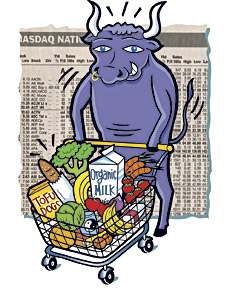Organic Profits
Natural Foods Superstores Are Doing Well
Eco-conscious investors looking to put their money where their mouths are need look no further than natural foods supermarkets
and NASDAQ. Two of the three leading national chains, Whole Foods and Wild Oats, are publicly traded stocks that have weathered the recent recession. (Trader Joe"s, the number two natural foods retailer after Whole Foods, is privately held).

Elizabeth Prager
Analysts report that the overall organic products sector is growing at 25 percent a year thanks to increased consumer demand and new federally mandated clarity in organic labeling. The biggest beneficiaries of that growth may be natural foods grocery chains, which offer volume efficiencies and healthy product mark-ups. Indeed, investors in both Wild Oats and Whole Foods are hoping that their stocks can bring home the non-fat tofu bacon.
Is Bigger Better?
Whole Foods started as a single store in Austin, Texas in 1980, went public in 1992, and has become the sector’s goliath while pioneering the supermarket concept in health food retailing. With 143 stores in the U.S. and Canada, the company offers more than 1,200 items.
Whole Foods stakes its reputation on being highly selective about what it sells, and is committed to ambitious quality goals and sustainable agriculture. (Though, inevitably, it is not as supportive of local organic growers as a small retailer rooted in the community would be. Also marring its reputation is a rigid anti-union policy. CEO John Mackey has called unions "parasites.") Whole Foods is consistently chosen as one of Fortune’s 100 best companies to work for, and was recently honored by Business Ethics as one of America’s 100 Best Corporate Citizens, in part because it uses solar energy for 25 percent of its power.
At the peak of the economic good times of the late 1990s, stock analysts were heralding newfound consumer consciousness as a trend worth watching, and had high hopes for the organic and natural foods sector. Whole Foods has lived up to the hype, with its stock tripling in value since those heady days. Today, however, most brokers are recommending a hold on shares for those investors already in, leaving the curious outsider to wonder if the company’s stock may be riding out the crest of its performance wave.
Wild Oats, the sector’s other NASDAQ-listed heavyweight, has 102 stores throughout North America. It has grown rapidly via an aggressive strategy of acquiring smaller natural foods retailers (especially following its 1996 initial public offering, or IPO). Wild Oats stores feature bakeries, coffee/juice bars and massage therapists as well as natural and organic grocery items. Business Ethics ranks Wild Oats very highly, citing the retailer’s pledge to ensure that 80 percent of its produce is organic, and its extension of profit-sharing to part-time employees. But like Whole Foods, Wild Oats is determinedly anti-union.
Despite its success Wild Oats" stock has been sliding, and takeover rumors abound. Some of the big mainstream grocers, including Albertson’s and Royal Ahold, are reportedly eyeing Wild Oats as a potentially strategic asset in their battle against Wal-Mart, which already leads North America in gross sales of organic foods.
In 2001, Perry Odak, fresh from steering Ben & Jerry’s into its deal with Unilever, took over the reins as president and CEO of Wild Oats. Analysts wonder if the Wild Oats board brought in Odak to engineer a similar sale. That said, some thick-skinned investors view Wild Oats" sagging stock price as an opportunity to get in cheap before any such deal bolsters performance.
Affordable Joe"s
The privately held and non-union Trader Joe’s operates 175 stores in 15 states, focusing on affordably priced private-label health foods, organic produce and nutritional supplements. To keep costs down, its stores have no service departments and a limited selection.
Entrepreneur Joe Coulombe—the original "Trader Joe"—started the company in 1958 as a small convenience store chain in Southern California. With its costs low and profits apparently surging, Trader Joe’s is not a likely candidate for an IPO, much to the chagrin of eager investors.
Even though many investors are skittish in the current stock market, analysts remain bullish on the natural and organic foods sector, and say long term investors will probably do fine by related stocks.
RODDY SCHEER is E‘s former webmaster and a freelance writer/photographer.

